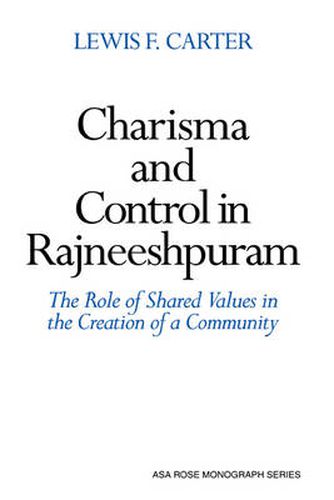Readings Newsletter
Become a Readings Member to make your shopping experience even easier.
Sign in or sign up for free!
You’re not far away from qualifying for FREE standard shipping within Australia
You’ve qualified for FREE standard shipping within Australia
The cart is loading…






Rajneeshpuram, a controversial religious community, transplanted from India to Oregon in 1981, attracted international attention when several of its leaders were arrested in 1985. The spiritual leader, Bhagwan Shree Rajneesh, was deported from the United States and others subsequently served prison terms for arson, poisonings, attempted murder, and other crimes. Rajneesh’s followers, called ‘sannyasin’, are distinguished from other religious groups by their denial of the legitimacy of any moral code for regulating conduct, their rejection of personal constraint by existing human institutions, and the absence of any stable shared system of beliefs. This book is a narrative account of the progressive regimentation of the commune and the escalating hostiles between it and the surrounding communities that led to eventual dismantlement. Based on first-hand observation and interviews, the author describes conditions in the settlement as these evolved through its brief and troubled history. Public documents and historical records reveal that the difficulties encountered by the Rajneesh movement in Oregon were but instances of a recurrent pattern for the group. The author argues that the absence of a shared belief system forces sannyasin community to revert to three ‘pre-legal’ mechanisms for controlling behaviour: personal confrontation, banishment from the group, and arbitrary charismatic authority. The group’s cyclic conflict with their ‘host cultures’ can be traced to the fact that these control mechanisms allow no accommodation with outsiders. The result is internal regimentation and external contests for absolute dominance. The first comprehensive treatment of the Oregon Rajneesh incident from a sociological perspective, this study offers insights into the importance of shared values for regulating group processes and for negotiating relationships with other groups.
$9.00 standard shipping within Australia
FREE standard shipping within Australia for orders over $100.00
Express & International shipping calculated at checkout
Rajneeshpuram, a controversial religious community, transplanted from India to Oregon in 1981, attracted international attention when several of its leaders were arrested in 1985. The spiritual leader, Bhagwan Shree Rajneesh, was deported from the United States and others subsequently served prison terms for arson, poisonings, attempted murder, and other crimes. Rajneesh’s followers, called ‘sannyasin’, are distinguished from other religious groups by their denial of the legitimacy of any moral code for regulating conduct, their rejection of personal constraint by existing human institutions, and the absence of any stable shared system of beliefs. This book is a narrative account of the progressive regimentation of the commune and the escalating hostiles between it and the surrounding communities that led to eventual dismantlement. Based on first-hand observation and interviews, the author describes conditions in the settlement as these evolved through its brief and troubled history. Public documents and historical records reveal that the difficulties encountered by the Rajneesh movement in Oregon were but instances of a recurrent pattern for the group. The author argues that the absence of a shared belief system forces sannyasin community to revert to three ‘pre-legal’ mechanisms for controlling behaviour: personal confrontation, banishment from the group, and arbitrary charismatic authority. The group’s cyclic conflict with their ‘host cultures’ can be traced to the fact that these control mechanisms allow no accommodation with outsiders. The result is internal regimentation and external contests for absolute dominance. The first comprehensive treatment of the Oregon Rajneesh incident from a sociological perspective, this study offers insights into the importance of shared values for regulating group processes and for negotiating relationships with other groups.